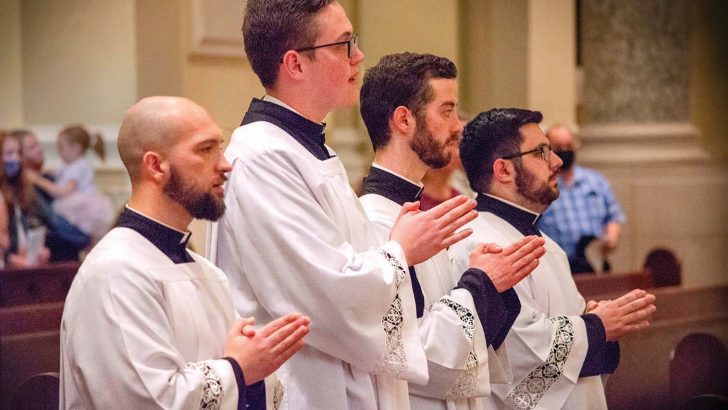The US state of Kansas ranks 27th in terms of American states for the percentage of residents who are Catholic. Some 18% of Kansans – fewer than one in five – identify as Catholic.
In the Diocese of Wichita – which covers 26 counties in south central and southeast Kansas – only about 10% of the almost one million residents identify as Catholic.
Against this backdrop, the diocese currently has 28 young men undertaking formation with a view to being ordained to serve the people of Wichita.
In an Irish context, this would be equivalent to the Archdiocese of Dublin having 280 seminarians preparing for priesthood. As it is, the country’s largest diocese with over a million Catholics is one of several Irish dioceses with not a single person in formation. Given the length of seminary formation this means that none of these dioceses will have a single ordination in the next seven years. Some Irish dioceses haven’t seen an ordination to the priesthood in a decade up to this point.
The situation when it comes to vocations to the priesthood in Ireland is bleak. And the landscape a difficult one – a combination of a tide of secularism and overwhelming scandal has contributed to a lack of trust in the Church and a corrosive lack of confidence in many hardworking priests and bishops. They have certainly borne the burden and heat of the day (cf. Matthew 20:12).
Lack of confidence
Some priests I speak to tell me that they lack the confidence to speak about priesthood and the fact that – despite the challenges – they derive great joy from their ministry journeying with people. That’s a terrible pity. Other priests, regrettably, indulge the widely-held stereotype of the lonely priest which makes priesthood seem particularly unattractive to younger people and – crucially – their parents.
I wonder today how many even very conscientious Catholic parents would encourage a vocation to the priesthood or religious life if one of their children expressed a desire to discern such a way of life.
Sometimes there can be a temptation to despair when it comes to vocations or the seemingly intractable problem of the vocations crisis. Many good people are involved and much good work has been done and is being done. Some of the religious orders have shown great tenacity is being able to help a steady number of young men take the path to discerning a vocation as part of their religious community. Not all stay, of course – but a steady flow of ordinations ensures the long-term viability of the congregations in Ireland and gives a boost to older members who can see someone coming behind them.
Sometimes in Ireland we lack the humility to look outside of our own local situation to see what works elsewhere. We can also be so mired in our own challenges that we fail to see that the Church and vocations to the priesthood have prospered in deeper crises, for as the scriptures tell us time and again God uses crises to call us to a deeper intimacy with him.
What is the Diocese of Wichita doing that is bearing so much fruit when it comes to vocations? I don’t know. I’ve never been and one can only learn so much from the internet. But I know that they are obviously doing something that is making priesthood seem a credible option for young men in the diocese.
Crisis of faith
A crisis of vocations is ultimately a crisis of faith, and if young people aren’t in the parishes to begin with then there is no-one to transition to discerning a vocation in the first place. Despite this, there are great seeds of hope in youth ministry in Ireland. Whether in the university chaplaincies or in groups like NET Ministries, Youth 2000 and the Legion of Mary, young people are embracing the path of discipleship.
When it comes to helping these young people discern priestly vocations, we need to look to places like Wichita and other parts of the world that have seen a reversal in vocational fortunes and adopt or adapt what they are doing well.


 Michael Kelly
Michael Kelly Wichita seminarians are installed as acolytes
Wichita seminarians are installed as acolytes